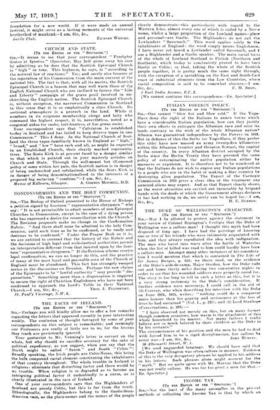CHURCH AND STATE.
(To Tan EDITOR Or THE " SPECTATOR."7 SIR,—It Seems to me that your correspondent "Presbyter Seotus.St Ignotus (Spectator, May 3rd) gives away his ease by admitting as he does that the Scottish Episcopal Church is " high " in tone. This highness, he says, is "according to the natural law of reactions." Yes; and surely also because of the separation of his Communion from the main current of the national life. The fact is that, with all its merits, the Scottish Episcopal Church is a beacon that may well warn those of the English National Church who are inclined to favour the " Life and. Liberty" campaign of the grave peril involved in un- churching the English nation. The Scottish Episcopal Church is, without exception, the narrowest Communion in Scotland in this sense that it is so emphatically a class Church. Its sectional atmosphere is a proverb in the land. While it numbers in its exiguous membership clergy and laity who command the highest respect, it is, nevertheless, noted as a congenial nidus for snobs, tuft-bunters, et hoc genus anise. Your corretmondent says that "Calvinism is established to-day in Scotland and has failed to keep diverse types in one Communion." This I deny. In the National Church of Scot- land the three types familiarly known in England as "high," " broad," and " low " have each and all, as might be expected in an Established Church, their clearly marked representa- tives. The Scots Kirk is at present faced by a danger similar to that which is pointed out in your masterly articles on Church and State. Through the well-meant but ill-omened policy of some within her pale, the Scottish nation is in danger of being unchurched and sedularized, while the Scots Kirk is in danger of being denominationalized in the interests of a proposed big sectarian "combine."--I am, Sir, &c.,


































 Previous page
Previous page